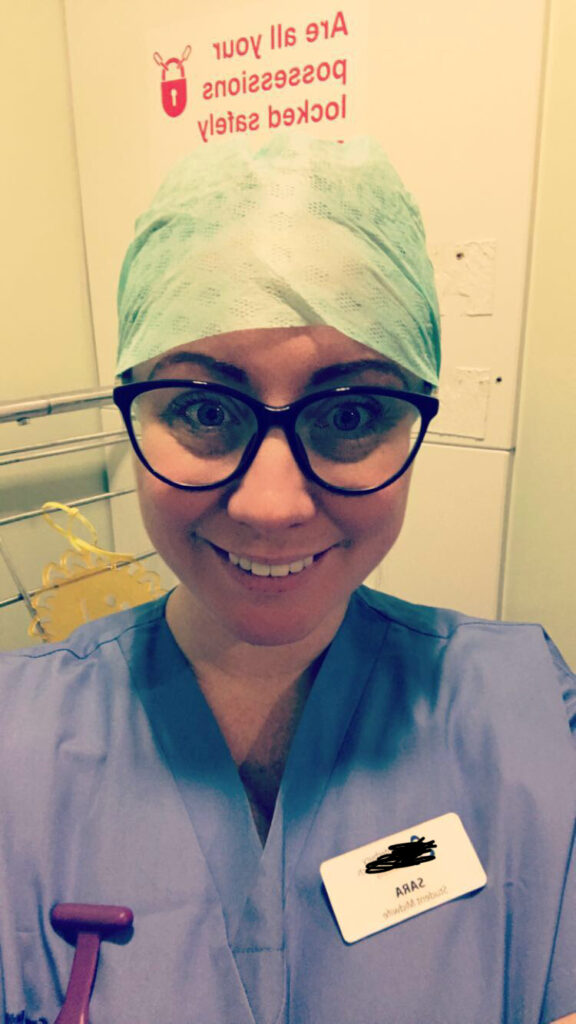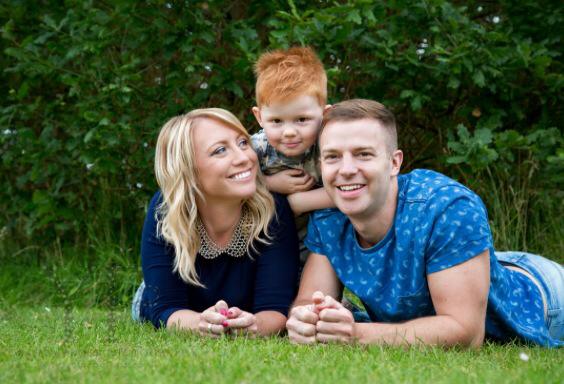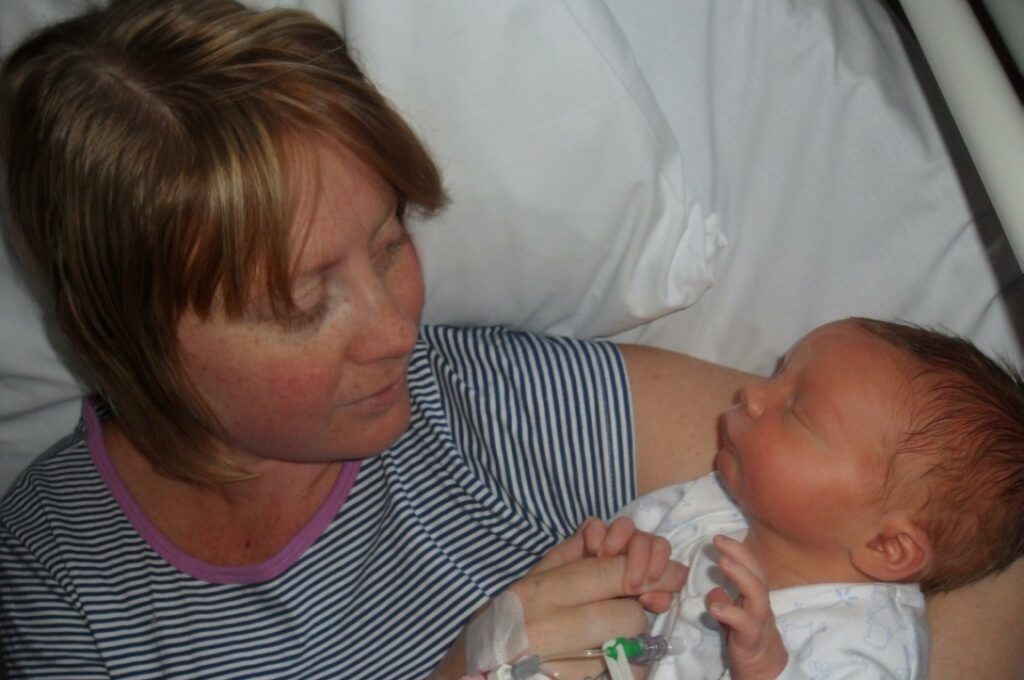Sara is a student midwife, a wife and mum to her 7 year old son. She is keen to let other women know it’s possible to be a mum, run a home, and still pursue career dreams.
Hi Sara, thank you so much for chatting with me. What made you want to become a midwife? What was your inspiration?
Hi Victoria! Thank you so much for asking me to take part in the Mummy Social meets series.
I have wanted to be a midwife as long as I can remember, but I never had GCSE science, so I thought it was a no go. It was always put on the backburner in relation to saving for a house, having a baby and then getting married until one day a friend told me about an access course that would lead me to midwifery. I enrolled onto the course and the rest in history! I’m not sure why I have always wanted to be a midwife, except for I love women! I truly believe we are powerhouses in every aspect of life. The fact that we are able to take something as little sperm and grow a whole other human being is a miracle in my eyes.

How far into your course are you actually in the ‘thick of it’ helping mums in labour and getting hands on experience?
The degree is a 3 year course and I’m currently coming towards the end of my 2nd year but my first ever placement in 1st year was on a high risk delivery suite. As part of the nursing and midwifery council (NMC) regulations, you have to witness 5 ‘normal’ deliveries before you can be hands on. I was hands on assisting with births within 3 weeks of starting placement, with a very close helping hand from my mentor. I think I took blood on my 2nd ever shift and you are expected as a student to be taking the observations (blood pressure, pulse, temperature, respirations) from the beginning really. Actually doing the practical work is the best way to learn and I remember doing my first ever vaginal examination on that first placement and thinking I am never going to learn this stuff, but the more you do, the more you understand.

I’m sure that it’s something you’ll never forget, can you tell us how you felt assisting with your first birth?
It was one of my last shifts on delivery suite in 1st year and it was a multip (2nd/3rd etc time mum). She had previously had a forceps delivery and she was desperate to push this baby out herself. It was coming up to the 1hr pushing, which is the cut off for when we have to ask a doctor to review before we can continue. I remember seeing the vertex (very top of baby’s head) when she was pushing and knowing she was going to make it. It was the first normal delivery I had been present at since completing my 5 witnesses, so I got my gloves on and applied a warm compress to the perineum as the head was advancing and beginning to crown. My mentor’s hands were on top of mine to guide me and a baby boy was born in great condition! The woman also had an intact perineum which is an amazing feeling knowing her recovery will be smoother. It was after the placenta was delivered that we let the couple know that it was my first ever hands on delivery. I was on a high and I don’t think I’ve ever come down from it!
Work life balance is tough for any mum, but for you doing 12 hour shifts, it must be hard to juggle everything. How do you effectively manage this? Do you have a great support network around you? I have always worked and returned to work from maternity leave when Noah (my son) was 10 months old. At that time, I worked for the Prison Service as an IT manager and they were great with work life balance. Noah attended nursery up until starting school and to be honest those days were easier!
My husband used to also work for the Prison Service as an officer in the gym, but now owns his own business as a personal trainer and we have a studio in the garden. I’m not sure I would’ve been able to pursue a career in midwifery so easily if he still worked shifts as we would’ve been stuck for childcare.
Both sets of grandparents live 30 mins away, and they all work full time, so we can’t rely on them too heavily. My husband has been able to block out of his diary school drop off and pick up times so that he always has that covered. Otherwise we use a babysitter, who is a friend/neighbour’s teenage daughter and we are so grateful to have someone we trust who lives so close by.
It’s hard, and sometimes a headache to arrange, but it’s do-able.

Do you think having had a baby helps you support a woman in labour better?
I had a really traumatic birth experience myself, which ended with me getting to fully dilated and pushing to then having an emergency caesarean section due to fetal distress. Afterwards I suffered a huge postpartum haemorrhage and actually ended up needing a lifesaving hysterectomy to stop the bleeding. I woke up in intensive care the next day being extubated from life support not having a clue what had happened to me. The last thing I remembered was saying “I don’t feel well”! I suffered quite a lot afterwards with my mental health and it took for me to have a mini break down to get the help I needed.
I genuinely don’t think you need to have had a baby to be able to support women in labour because I think we all bring something different to the profession regardless of our life experiences.
I do however think my trauma has made me very aware of when women potentially need more support or help when things haven’t gone to plan, and I really do my best to ensure they are aware of the different avenues available to aid them in their recovery.

There are obviously times when things don’t go to plan? How do you cope with this?
I’m hugely touching wood here, because I am yet to see or be involved with anything that hasn’t gone to plan as a student midwife.
I have only had one situation where I couldn’t find the fetal heartbeat during labour and it felt like forever. Both myself and my mentor expected the baby to be born in poor condition and I did feel my bottom lip wobbling a little! When the baby was born, it screamed its head off and we all had a sigh of relief!
I think the main thing to consider if things don’t go to plan is that I may need a debrief with others involved so that we can talk about what happened. Reflection is also a big thing in midwifery and to reflect on the situation and research how things could have gone differently can often help lots.
It is important to know that if you have given excellent care and followed the guidelines correctly, there is nothing else you could’ve done and unfortunately things don’t always go to plan regardless.
Do you have any advice for any member of our audience looking to pursue a career in midwifery?
Go for it! Go for it! Go for it! If it is something you have always wanted to do, and you can’t get it out of your head, bite the bullet and do it.
Age is nothing but a number, even more so in midwifery. In our cohort we have 18 years olds right up to 50 years old. We have school leavers and business owners, people with no children, others with 5!
I can honestly say I have never felt this fulfilled or happy in my work and I’m not even getting paid for it! So, imagine when I am!
It’s a lifelong career that has so many avenues within in, meaning it will always have something to keep you gripped.
Plus what could be more amazing than seeing new life enter the world?!
To follow more of my story, you can find me on my own Instagram page: @thelifeofastudentmidwife
I am also a student blogger for Clemmie Hooper’s blog, Gas and Air, where you will find birth stories, posts from professionals and two other student midwives on their journey’s. There is also an Instagram page where the posts are shared alongside other information: Gas and Air.
